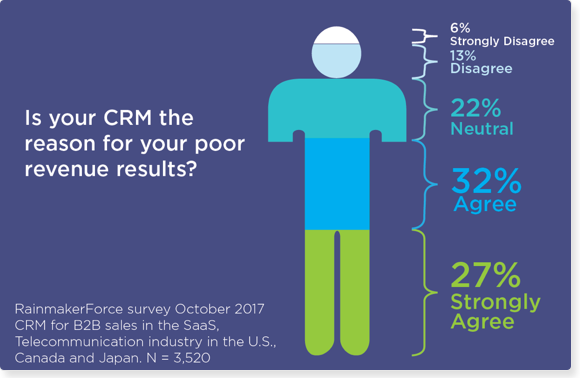Sales Freakonomics: Are you afraid of success or afraid of failure?
Did you know that people not only fear the bad, but also the good? If you were asked, as a salesperson, what scares you more, you’d say “fear of the bad.” That’s logical. However, it so happens that salespeople aren’t actually aware that they fear the good also, and there certainly back it up!
Let’s start by asking what you fear, success or failure? In a study we did in late 2017, you’d be surprised to know that 68.1% of salespeople throughout the nation actually exhibited behavior that demonstrated fear of success.  We confess that it was quite surprising for us too. What is even more surprising is that people in that 68.1% ranged from fresh (inexperienced) SDRs all the way up to Senior Vice Presidents. Yes, Senior Vice Presidents of sales are as afraid of success as anyone else in sales!
We confess that it was quite surprising for us too. What is even more surprising is that people in that 68.1% ranged from fresh (inexperienced) SDRs all the way up to Senior Vice Presidents. Yes, Senior Vice Presidents of sales are as afraid of success as anyone else in sales!
Now, let’s put things in perspective before we get ahead of ourselves. Salespeople come from various backgrounds, work at different industries and companies and on various sales tasks. They are also exposed to different aspects of sales or the selling process based on their role. However, they are all focused on revenue. When we started asking them why they were unable to achieve their goals, we started seeing what really goes on behind-the-scenes of a sales organization. Admittedly, there is a lot of blame to go around for failing to achieve sales targets. But figuring that out is not productive. The real question is what can be done about it going forward. So, let’s ask, “How: How are we, as salespeople, afraid of success?”
Backgrounder
This study, done by RainmakerForce in 2017, was titled, “Can your sales team get you there?” The findings were collected through a survey questionnaire that used conjoint analysis, to determine true causal relationships when multiple factors are mixed-in together. Our study started out to ask the reasons for poor sales performance across organizations. While we found many reasons that one would generally expect, we investigated deeper into what salespeople might themselves bring to the table, and what they were doing (or not doing) that was impacting revenue performance. So, we based our study on behavioral science to understand how people’s own native and learned behaviors in sales situations may be causing certain results. For reference, in this study, the definition of a salesperson used is anyone who is measured against a quota (whether their own or their team’s) AND either their variable is at least 30% of their OTE or they were directly responsible for revenue generation (senior leaders). Therefore, this study excludes professionals in sales decision-support functions like operations, finance, training, compensation and program management.
Do you really know what you bring to the table?
The salient finding of this study was that, regardless of role, salespeople were doing many things that were keeping them from success. In other words, when we factored out tools, technology, process, training, and product-set, their own actions showed the strong causal impact on sales performance. Many of the respondents (77.2% of all people surveyed) were not even aware of it.  It looks like salespeople aren’t really “self-aware” i.e. they are not conscious of their own character, motives, and actions. It is indeed concerning to think that people who are not aware of themselves are the ones talking to our most valuable prospects and customers. An example of how this might manifest in practical sales situations is a sales rep speaking 80% of the time during a meeting with a prospect and pitching away their product’s features when not really “listening” to or understanding the prospect. More on that later.
It looks like salespeople aren’t really “self-aware” i.e. they are not conscious of their own character, motives, and actions. It is indeed concerning to think that people who are not aware of themselves are the ones talking to our most valuable prospects and customers. An example of how this might manifest in practical sales situations is a sales rep speaking 80% of the time during a meeting with a prospect and pitching away their product’s features when not really “listening” to or understanding the prospect. More on that later.
The Big Findings
Our study found thirty or more behavioral reasons for poor revenue performance. However, for the sake of brevity, we can summarize them into groups based on position and seniority. We list the top three reasons under each group. Note that these are listed in no particular order, nor segmented by industry, location, years of experience on the job, education or gender.
Senior Leadership (VPs, GMs and above):
- Afraid of internal change – how they are perceived within the organization by C-staff, fear of changing systems or processes, fear of being too disruptive, don’t-fix-it-if-its-not-broken thinking
- Lack of sales vision – explaining why they are asking their teams to do something and why that matters to the company and the team at a personal and professional level
- No demonstrated empathy of rank-and-file salespeople
Sales leaders (Directors, Senior Directors, Head of Sales etc.):
- Lack of ‘thinking time’ or strategic thinking skills – Fighting too many fires (both within their own company and with customer demands on deals & opportunities), don’t have time to think strategically (even if they have the skills for it) and they do not help structure organizational vision into understandable tactics
- Inability to execute – unwillingness or lack of interest skill in working through influence (as opposed to authority), managing multiple and conflicting priorities, managing to a deadline, or being a role model
- Both ’lack of resourcefulness’ AND ‘lack of communication’ scored the same – acceptance of the cards they are dealt with as opposed to what they have the power to change, inability to connect the dots for their teams, unwillingness to get down into the details and helping their team navigate through internal or external obstacles

Front-line Managers (with supervisory roles but are not Directors):
- Attitude to win – living it, demonstrating it, teaching others how to
- Lack of “customer-oriented” and “strategic” thinking – Inability to understand their prospects’ true needs and how to overcome their objections, setting up a process for teams to do research before picking up the phone or sending an email, or not able to determine why their organization is doing certain things and why that matters
- How they are perceived by their peers or team members – not wanting to do things for their team or for customers by assuming others will perceive them as incompetent, aggressive or tacky or, not being “classy” or “smart”
- Lack of communication – inability or lack of skills in connecting the dots for their teams on how things work and what can be done for moving deals forward.
Quota-carrying reps (no supervisory role):
- Attitude to win – doing whatever it takes to win deals
- Lack of understanding the prospect (or customer)
- Lack of follow-up (both inside their organization to find answers for prospects and follow-up persistently with prospects)
- Lack of pure sales skills – to influence buying, to change prospects’ thinking or earning the position of trusted advisor
You might now be wondering who these people are. Perhaps it isn’t you or your team? Well, our survey was done with 18,986 salespeople in the US in B2B sales across Tech (including Telecom), Manufacturing, Engineering, Business Services and Financial Services in 2017.
And, so, what does this mean?
While it is well-known that salespeople are motivated by the company they work in, the products they sell and their comp plans (of course), there are the top 5 interesting finds:
- Only 23.2% are truly hitting numbers (exceeding cumulative annual quota)
- Only 9.4% are consistently exceeding their quota (month over month)
- More than 74.6% of companies have invested in sales tools but a mere 10.48% are seeing tangible results because of those tools (direct or indirect causal relationship)
- Is CRM the reason for your poor revenue results?
- Already-employed salespeople considering a new job: 47.9%

Ok, so, why should you care?

We, at RainmakerForce, are merely the messengers. We conducted this study out of our pure passion for sales and to determine what we can do to help. We believe that Sales should always produce, be predictable and not be a game of guesswork, for anyone. This is what drives our moral and business compass and we help make this happen in any sales organization with data and technology.
If you want to know whether your team can get you there or what your team’s “Sales DNA” is truly made of, or how to overcome turnover without wasting a lot of dollars in consulting and training, give us a shout here. We will construct your team’s DNA from the ground-up and tell you things you’d be absolutely surprised to hear. We provide ourselves in proving (or disproving) everything with data, otherwise everything is just an opinion!
Folks, it is your choice whether you dispute this data, ignore it or do something about it yourself. To quote our good friends at Dream Theater, “ The answer lies within.”
DISCLAIMER
The data and responses expressed in this study are those of the survey respondents. They do not purport to reflect the opinions or views of RainmakerForce Inc. or its subsidiaries.



